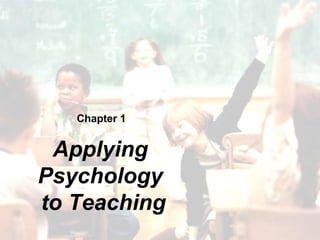Weitere ähnliche Inhalte
Ähnlich wie APPEL PSY 263 401 Chapter 1 (20)
Kürzlich hochgeladen (20)
APPEL PSY 263 401 Chapter 1
- 2. © 2013 Cengage Learning. All rights reserved. 1 | 2
Overview
• What is Educational Psychology?
• How Will Learning About Educational
Psychology Help You Be a Better Teacher?
• The Nature and Values of Science
• Complicating Factors in the Study of Behavior
and Thought Processes
• Good Teaching Is Partly an Art and Partly a
Science
• Reflective Teaching: A Process to Help You
Grow From Novice to Expert
- 3. © 2013 Cengage Learning. All rights reserved. 1 | 3
What is Educational Psychology?
• Educational psychology is …“a scientific
discipline that uses psychological constructs and
research methods to understand how the
various characteristics of
students, teachers, learning tasks, and
educational settings interact to produce the
everyday behaviors we see in school settings.”
- 4. © 2013 Cengage Learning. All rights reserved. 1 | 4
How Will Learning About Educational
Psychology Help You Be a Better Teacher?
• Teaching Is a Complex Enterprise
Educational psychology provides information about
the many factors that affect teaching and learning
• Research Can Inform Teachers
Educational psychology offers useful and tested
ideas for improving instruction
• Coursework and Competence
Educational psychology helps prepare teachers to be
effective by providing them with pedagogical content
knowledge
- 5. © 2013 Cengage Learning. All rights reserved. 1 | 5
Teaching is a Complex Enterprise
• Teaching is in top quartile on complexity for all
occupations
Teachers are responsible for diverse
populations with varied needs
Teachers are constantly making decisions
before, during, and after instruction
Teachers need to be knowledgeable about
many things and have a wide range of skills
- 6. © 2013 Cengage Learning. All rights reserved. 1 | 6
Research in Educational
Psychology Informs Teaching
• Examples:
Use more advanced students to tutor less
advanced students
Give positive reinforcement and corrective
feedback to students
Communicate to students about expectations
Require students to respond to higher-order
questions
Provide students with cues about the
upcoming tasks
- 7. © 2013 Cengage Learning. All rights reserved. 1 | 7
Research in Educational
Psychology Informs Teaching Cont.
• Examples continued:
Teach students how to monitor and improve
their own learning efforts
Know students’ misconceptions
Create learning situations where students
customize information and problems for
themselves
Accept responsibility for student outcomes
Show students how to cooperate
- 8. © 2013 Cengage Learning. All rights reserved. 1 | 8
Coursework and Competence
• Teachers who have had relevant coursework in
education and psychology are likely to be more
competent and satisfied with their training than
teachers who lack such coursework
See Online Video Case (Chapter 16)
“Teaching as a Profession: What Defines Effective
Teaching?”
- 9. © 2013 Cengage Learning. All rights reserved. 1 | 9
The Nature and Values of Science
Non-Scientific Observation
Vs.
Scientific Observation
- 10. © 2013 Cengage Learning. All rights reserved. 1 | 10
Limitations of
Non-Scientific Observation
• May draw false conclusions because particular
beliefs or experiences are simply assumed to be
true. Thus, alternative explanations are not
considered or idiosyncratic factors are given too
much importance
• Retaining students in a grade is an example of a
practice that results from non-scientific
observation
- 11. © 2013 Cengage Learning. All rights reserved. 1 | 11
Strengths of Scientific Observation
• A systematic, scientific approach to studying
educational problems is characterized by:
a representative sample of subjects
control of non-relevant variables
objectivity
published procedures and results
replication by others
- 12. © 2013 Cengage Learning. All rights reserved. 1 | 12
Complicating Factors in the Study
of Behavior and Thought Processes
• The Limited Focus of Research
• The Complexity of Teaching and Learning
• Selection and Interpretation of Data
• New Findings Mean Revised Ideas
- 13. © 2013 Cengage Learning. All rights reserved. 1 | 13
Good Teaching is Partly
an Art and Partly a Science
• The Argument for Teaching as an Art
Motives, beliefs, emotions, values, flexibility,
are all part of successful teaching
• The Argument for Teaching as a Science
Usable body of research findings
- 14. © 2013 Cengage Learning. All rights reserved. 1 | 14
Good Teaching is Partly
an Art and Partly a Science Cont.
• The Teacher as Artistic Scholar: Combining the
Art and Science of Teaching
The artistic scholar strikes a balance between
the art and science of teaching by using
research findings as ideas that might be
applicable to a particular group of students at
a particular point in time
- 15. © 2013 Cengage Learning. All rights reserved. 1 | 15
Reflective Teaching
• Reflective teachers:
Make extensive use of formative assessment
to generate information on which to reflect
Have an introspective orientation, are open-
minded but questioning, take responsibility
for their decisions and actions
Are able to use compelling evidence in
support of a decision
